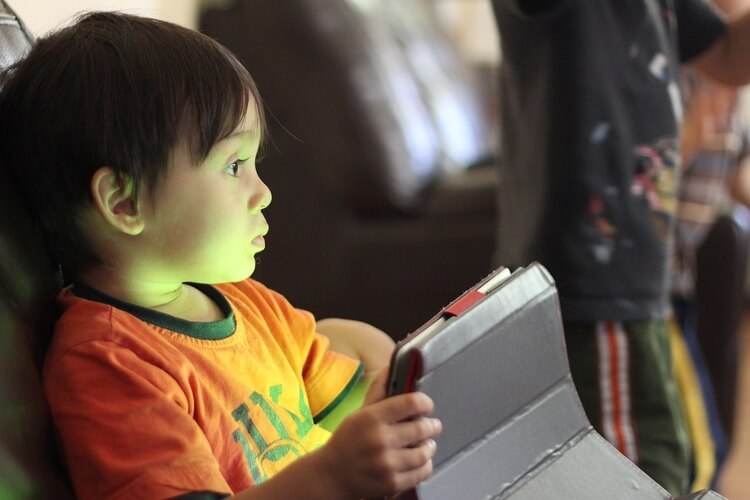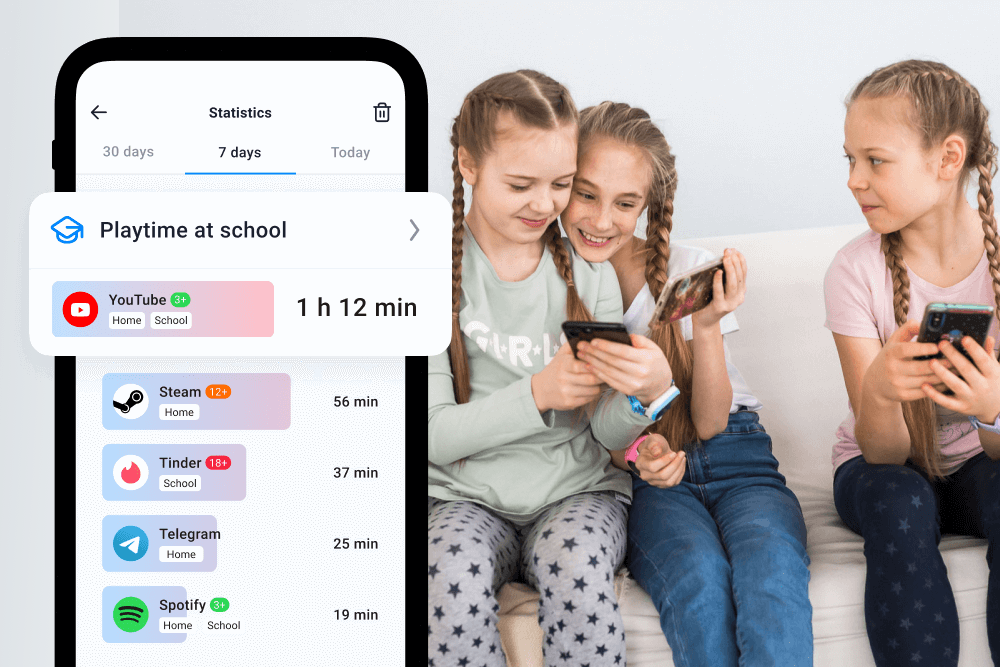Parenting In The Digital Age: How To Be An Awesome Parent

There’s no denying it. Parenting in the digital age can be extremely tough, no matter the age of your child. Technology is progressively becoming part of our everyday lives, and many children today are brought up in an environment surrounded by digital devices such as smartphones and tablets.
Keeping up to speed with the latest technologies is crucial if you want to be a successful parent.
In this article, we’re going to be discussing how you can be the best parent possible to your child in the digital age.
The best parental control app is the Findmykids app from the App Store and Google Play. It provides amazing features like live location tracking and listening to surrounding noises, and others. The best part is that you can use it for your toddlers and teenagers.
Contents:
- Parenting In The Digital Age: Trends Amongst Children
- How To Prevent The Negative Effects Of Technology On Your Child
- The Pros & Cons Of Children Using Technology
- Tips on Parenting In The Digital Age
- Tips On Positive Parenting
- Limits & Technology Milestones For Different Ages
- FAQs
Parenting In The Digital Age: Trends Amongst Children

Prostock-studio/Shutterstock.com
Knowing how technology has impacted parenting is extremely important. Although technology may provide huge advantages to our society, there are also massive negative impacts that can greatly affect your child.
Parents today face unique challenges of parenting, such as balancing access to online content while still ensuring their child’s physical, social, and emotional development. Unlike past generations, digital media is woven into nearly every aspect of childhood.
Many studies have shown the negative impact of digital technologies on children. The overuse of computers from an early age can affect many areas of a child’s life, including academic success.
As studies suggest, the use of digital devices can cause poor concentration, disorganization, underdeveloped language skills, and a severe lack of creativity.
Facts and Tips
A study released by Pew Research offers proof that parenting children in the digital age is challenging.
In the United States alone, 66% of parents (who have at least one child under the age of 18 but may also have adult children) said that parenting is more difficult today compared to parenting 20 years ago.
The reason why such a high number of parents feel this way? It’s due to the rise of technology. And evidence of this is seen in the following stats.
Facts About Parenting in the Digital Age
According to the study, when asked whether parents were concerned if their children spent too much time looking at a screen, the results showed:
- 71% of parents are concerned that their child might spend too much time in front of a screen.
- 31% of parents indicated they’re very concerned that their child might spend too much time looking at a screen.
- 84% of parents feel confident that they know how much screen time is too much for their children.
A majority of parents with these concerns seek out advice from other professionals to help with today’s modern technology challenges.
- 61% of participating parents (of children 11 or younger) indicated they had received information or advice from a medical professional or doctor about screen time.
- 55% said they received screen time information from other parents.
- 45% of parents (of children ages 5 to 11) said they turned to teachers for help regarding screen time.
The biggest concern for parents is the long-term effects of smartphone technology on a child’s learning and development. So, it’s interesting to note that the vast majority of parents involved in the study limit how long and when their child uses screens. In addition, digital grounding is a common practice amongst this group of parents:
- 86% of parents (with a child aged 5 to 11) said they limit the length of time or time of day their child uses screens.
- 80% also said they take screens or internet access away from their child as a form of punishment.
These stats give parents a lot of information about how technology can impact parenting in the digital age. So, how can they use this data to be an awesome parent?
Tips for Parenting in the Digital Age

Prostock-studio/Shutterstock.com
One of the best things parents can do in this digital age is to help their kids build a healthy relationship with technology and become responsible digital citizens. In short, parents should educate their children on how to use digital technology safely and effectively.
Creating a family plan is a helpful way to set ground rules. A family media plan can outline daily screen time limits, rules for social media, and clear expectations around online behavior. This ensures everyone in the household has consistent guidelines.
For example, if a teenager is playing an online game with a chat, discuss with them what words or requests from strangers should be a danger signal. If your child is using social media, walk through privacy settings together so they understand how to protect their personal information.
In addition to how much screen time children get, parents’ concerns about digital addiction and online privacy also affect what they allow their kids to see.
One tip is to use apps like Findmykids, and smartphone or internet settings. Using these tools makes it possible to monitor a child’s online activities.
According to the same Pew Research study:
- 75% of participating parents with a child aged 5 to 11 check websites and apps.
- 72% use parental controls and restrict how much time their child spends looking at a screen.
- 49% monitor text messages and call records.
- 33% of parents use apps like Findmykids or GPS to track their child’s location.
And these tips don’t just apply to your children!
A majority of parents involved in the study also expressed concern over their own use of technology:
- 68% of parents said they felt at least sometimes distracted by their smartphone when with their children.
- About 8 in 10 parents use social media to share information about their children.
- Almost half indicated that others share too much about their young kids on social media.
- 24% of parents who use social media feel pressured only to post what makes them look good. (This stat varies by gender, education, and age.)
Digital citizenship doesn’t just apply to kids. It also applies to parents. Being an informed parent and taking note of these tips for dealing with the digital age is half the battle.
With a shift toward virtual learning, digital communication, and the rise of social media, it’s impossible to reduce a child’s screen time by 100%. However, using these tips allows parents to employ device management to keep children safe from dangers like online predators.
The 5 C’s from AAP: How to Apply Them at Home in 15 Minutes
The american Academy of Pediatrics (AAP) recommends following the 5 C’s—five key principles that help parents raise children in the digital age. We’ve expanded these recommendations with practical steps you can implement in just 15 minutes a day—and integrated Findmykids features for convenience.
→→→
| Principle | What It Means | How to Apply at Home in 15 Minutes | How Findmykids Helps |
| Content | Discuss what your child watches, reads, and plays. | In the evening, ask your child to show you 2–3 favorite videos or games and share what you liked and what raised questions. | Monitor the apps your child uses most and set filters. |
| Communication | Talk openly about rules, risks, and the purpose of online activities. | During dinner, ask: “What’s the most interesting thing you learned online today?” | Send messages directly to your child’s device through the app to keep the conversation going in real time. |
| Consequences | Explain the consequences of breaking digital rules. | Give an example: “If you play after the agreed time, we’ll reduce your screen time tomorrow.” | Set automatic screen time limits when usage exceeds the set allowance. |
| Consistency | Stick to the same rules for all family members. | Agree on a common “digital bedtime” and follow it together with your child. | Enable “night mode” on your child’s devices at the set time. |
| Cooperation | Create rules together with your child, considering their opinion. | Decide together how many hours per week can be spent on a favorite game. | Create an app usage schedule and approve it jointly. |
How To Prevent The Negative Effects Of Technology On Your Child
Technology has transformed the way our kids interact with each other and the world. Although there are benefits to children using technology, such as the use of educational apps, the negative effects of using digital devices are unquestionable.
Parenting In A Digital World Using Parental Control Apps
Many devices, including smartphones, have downloadable applications that can be installed to prevent your child from accessing potentially malicious content online.
Certain parenting technology applications, such as the Findmykids app, will enable you to track your child’s activity on their smartphone or tablet. You’ll be able to view websites they’ve visited online and applications they’ve used. The app also helps set up geolocation alerts, ensuring that parents know where their child is at any given time.
Beyond apps, parents should also take time to review privacy settings on each device or platform their children use. Even something simple like limiting who can send a message request on social media can protect children from unwanted interactions.
Other useful platforms to monitor and limit your child’s activity online include:
- Kids360 — which covers most major devices, including iOS (iPhone, iPad, and iWatch) and Android. Parents can limit the amount of time their child spends online, set specific hours for device use, and monitor which apps are being used. It provides a detailed report of screen time across devices, allowing you to spot trends that might need addressing. Kids360 is especially useful for parents concerned about their children being distracted by social media or gaming during study time.
- KidLogger — available for Mac OS, Windows, and Android devices.
- StayFocused — a Google Chrome extension that limits time spent on specific websites, including social media networks.
Through the use of these applications, you’ll also be able to block specific websites and digital activities, meaning your children won’t be able to access potentially malicious content. You’ll also be able to limit the amount of time spent on websites, including social media platforms, that may distract them from what they’re meant to be using the device for.
Ensure your child’s safety and promote healthy digital habits with Findmykids and Kids360 apps. With Findmykids, you can track your child’s location in real-time and monitor their phone usage, giving you peace of mind no matter where they are. For added control over screen time and app usage, the Kids360 app lets you set limits on device use, block distracting content, and monitor what your child is up to online.
Keeping Your Child Active

Prostock-studio/Shutterstock.com
There’s no doubt that childhood obesity is becoming an epidemic in our modern-day society.
This childhood obesity crisis is brought on by a variety of factors, including dietary habits and inactivity. As technology has become more prevalent, children are less likely to seek entertainment by going outside and playing with friends, as they can play video games and interact with their peers online.
This can be an extremely sad state of affairs, as your child can grow to become unfit and unable to develop key social skills.
To bypass the chance of your child becoming lazy and lacking physical activity due to excessive screen time on smart devices, you should schedule times each day that ensure your child is staying active. Creating tech-free zones in the house or outdoors can also encourage them to step away from their digital life and into the physical world.
Some ideas on keeping your kids active include:
- Signing them up for school clubs
- Organizing meetups so they can socialize with their friends
- Getting them involved in sports
- Take them to your local park
- Take them swimming
A simple approach is linking screen time to movement. For example, if your child loves watching YouTube, ask them to do a short activity, like stretching, dancing, or taking a walk, before starting another video. This creates a balance between online activity and healthy physical habits.
As your kids take part in more activities on a regular basis, they’ll perceive said activities as their main source of entertainment, as opposed to constantly using digital devices.
Building Your Relationship With Your Child
All too often, children can quickly become lost in cyberspace without realizing the importance of family time.
If exposed to digital devices for too long, your child will become more detached from family over time. This is why you must schedule a time to bond with your child on a regular basis.
This doesn’t have to be anything dramatic, just sometimes, when you and your child can build your relationship, away from digital devices.
Some suggestions for bonding time activities include:
- Making sure your family dines together most nights of the week
- Taking your child on family trips out
- Reading a book with your child
- Cooking or baking
If your child enjoys online games, ask them to teach you how to play for 20 minutes. Even if you’re terrible at the game, the shared laughter and teamwork show your child that technology can also be a tool for connection rather than separation.
It’s simple activities that you can incorporate into your daily life that will help you to maintain and grow a healthy relationship with your child away from the distractions posed by digital devices.
Read also 17 Negative & Positive Effects of Technology on Children and How to Overcome Them.
The Pros & Cons Of Children Using Technology

Prostock-studio/Shutterstock.com
There are many different pros and cons when it comes to your child using technology. Although technology, in some instances, can pose negative impacts on your child’s development, many benefits can come from using it.
Digital media can be both a powerful educational tool and a potential distraction. Understanding its role is key when weighing the pros and cons of your child’s technology use.
Here are some of the pros of your child using technology:
1. Preparing Your Child For Their Future Career
Your kids and technology are only going to progress together. This means the likelihood of your child attaining a technology-based career is ever-increasing.
Most industries today require their employees to have sufficient technical skills to perform well at their jobs. These skills include the use of many software programs and knowing how to perform tasks online.
This is one advantage of exposing your child to technology at a young age, as it will give them time to harness their tech skills. By the time they reach the age of employment, many children will have proficient skills using digital technologies.
2. Educational Tools
This is a huge positive, and one of the main reasons why you should encourage your child to use digital devices.
Many online education tools or downloadable applications help to improve your child’s experience of education by gamifying the whole experience. Your child will often receive in-app rewards for completing activities, which acts as a huge incentive.
Try downloading apps such as Monkey Word School Adventure, Todo Math, and Duolingo onto your kid’s smart device and encourage their use of them on a regular basis.
3. Improving Cognitive Function
Studies have shown that children who play video games regularly have advanced cognitive skills compared with children who don’t play video games.
Research published suggests that video games that are specifically designed to improve cognition can be extremely beneficial. These games, often labeled as brain-training games, have been shown to significantly boost cognitive performance,
4. Easier Access To Information
Although this can be seen as a negative, giving your children easier access to information can dramatically improve their speed of learning.
Children can be extremely curious about many things. Sometimes, it can feel like a task trying to keep up with all the questions they’re asking you.
Encouraging your child to use search engines, social networks, and other online resources to learn about the world around them can be very beneficial.
Not only will this encourage your child to become more independent with their research, but it will also enhance their capacity for learning.

Prostock-studio/Shutterstock.com
Here are some of the cons of your child using technology:
1. Underdeveloped Social Skills
One of the unfortunate and all too common side effects of children using modern technology regularly is the lack of real-life interaction with others.
This leads to children growing up without forming the essential social skills that they’ll need for life. This can result in children finding it difficult to form friendships and relationships with others as they grow up and in later life.
2. Children Become Inactive
Constant use of technology can result in children becoming increasingly inactive, as they rely on digital devices for most areas of their lives, including socializing, entertainment, learning, etc.
Sedentary lifestyles are associated with many physical health issues, as children aren’t being active enough in the real world—think childhood obesity.
3. Addiction To Technology
Often, children can become seriously addicted to using smart devices such as smartphones and tablets.
This can lead to further negative consequences, including unwanted behaviors upon the prohibition of such devices. Children could potentially form behavioral issues that may harm their development as a result of their addiction.
4. Safety Risks
There’s no denying that there’s a huge range of safety risks posed by the use of the Internet.
It has been proven that many children have seen malicious content online, including graphic pornography.
A majority of parents leave their children unsupervised whilst using the Internet, thus they have free rein to visit any website and potentially even get involved with bad actors online.
Related: Social Media Is Toxic: How to Protect Your Kids from It.
Tips on Parenting In The Digital Age

Prostock-studio/Shutterstock.com
As you may have noted, being a parent in the digital age can be tough. However, this doesn’t necessarily mean you need to abolish all forms of technology from your child’s life.
Here are a few tips on parenting in the digital age that will help improve day-to-day life for both you and your child.
Educate Your Kids On the Importance Of Real-Life Interaction
Digital devices and social networking apps are often viewed by children as supplements for real-life interaction. But, as we all know, this isn’t the case at all.
Although there are points to be made in terms of social media being beneficial for your child’s social life, you must instill in them how crucial real-life social interactions are for both physical and mental health.
Humans are known to be social creatures, with studies showing that humans who are more socially active tend to have a better lifespan. Your child must understand that no amount of digital technology can replace in-person social interactions.
Set Clear Boundaries
Setting key times when your children can use a technological device is also key when parenting in the digital age.
Some examples of time zones where the use of digital devices is prohibited include:
- An hour before bedtime
- Weeknights before their homework is complete
- Before school
- When family and friends are visiting
- During meal times
Setting these boundaries will help to reduce the negative effects associated with the overuse of smart devices.
Consider Age To Introduce Technology

Prostock-studio/Shutterstock.com
It’s important to consider at what age you choose to introduce digital devices to your child.
As studies show, the use of digital devices from an early age can show positive and negative effects, depending on the purpose of the device and how long it’s used for.
However, it’s recommended that children under 24 months old should not be exposed to smart devices as frequently as a more developed children.
You may want to consider limiting your child’s use of digital technologies until school age. Many children will be required to use technology during their education, so it makes sense to start introducing it to your child just before they begin full-time education.
Interact With Your Child Using Technology
Using technology doesn’t always have to be a solitary experience.
Set some time aside to interact with your child using digital devices such as computers, smartphones, and tablets.
There’s a huge range of applications and digital platforms that parents and children can both use, and can prove to be a beneficial bonding experience.
The next time your child is playing a game on their device, sit with them and get them to explain it to you. Then suggest finding games that you can both play together.
Tips On Positive Parenting

Prostock-studio/Shutterstock.com
To know how to manage your child’s development during this digital age, it is important that you fully educate yourself on the benefits and risk factors of modern technology.
However, it’s also important to employ a range of positive, tech-free parenting practices to ensure that your child grows to be positive themselves.
Here are a few ways you can be a positive parent and help your child grow up in a positive environment that will be hugely beneficial to their development.
Encouraging Independence
Encouraging your child to become an independent person will pay off huge dividends as they grow older.
There are a variety of ways you can do this, including encouraging your child to safely explore the digital world. This can start by granting your child the freedom to browse the web unmonitored, whilst educating them about the dangers of online use.
Communicate Openly
It is extremely important that foster an environment that encourages your child to speak openly about anything.
As discussed previously, when parenting in the digital age, you must be aware of the risks posed by technology. If your child is experiencing anything negative while using their digital device, they need to know that they’re able to converse with you about the situation.
With the rise of social media, instances of grooming and cyberbullying are becoming far too common. This is why you must remind your child that they’re able to raise any issue that they feel uncomfortable with.
Positive Interaction
Make sure to positively interact with your child regularly. This will help encourage your child to have a positive mindset and learn to have fun.
This interaction can be with or without a digital device, but initiating these kinds of positive playful interactions away from technology will show the child that there’s more to life than a smart device.
Encourage Critical Thinking
With the rise of aI content and the freedom to post anything on the Internet, it is important for parents to encourage their children to think critically. In 2023, 49% of adults said that it was becoming harder to determine whether what they read online was true or false. Teaching your children about digital literacy and identifying when they come across misinformation or content that has an underlying agenda is super important.
Right now, even a majority of parents may not realize that they have to work on their own digital literacy. Encourage your kids to think critically about the photos, videos, and articles they read and to question everything on the Internet.
Parents can also introduce the idea that not all digital media is created equal. Encourage your children to compare sources, ask who created the content, and consider why it was made. This type of awareness helps children avoid misinformation and builds strong media literacy skills.
Be The Student
Often, as a parent, you want to teach your child everything you know for them to successfully develop into adulthood.
However, sometimes it’s important to take time to let your kids teach you something new every day. Children are notoriously curious about a wide variety of topics. Find something they’re passionate about and take a huge interest in it.
Again, this process can take place in the absence of a smart device. However, prompting your child to do further research on a topic they love using the internet will reinforce good online practices, and will encourage them to use a digital device as a learning tool.
Limits & Technology Milestones For Different Ages

Prostock-studio/Shutterstock.com
It’s important to take into account the age of your child when introducing them to technological devices such as smartphones and tablets.
0–18 Months
You want to be progressive in your approach to giving your kids digital devices. Many recommend not exposing children to smart devices before they’re 18 months old. This makes sense, as your child is in the most crucial stages of development at that age, and you don’t want technology to disrupt their natural development.
Preschool
As your kids grow to become preschoolers, you may want to slowly incorporate technology into their daily routines. Whilst this doesn’t mean enabling them to have access to social media networks, you should encourage them to use their device for educational purposes only.
School Age
When your children are attending full-time education, they must have access to a digital device that will help facilitate their learning process.
It’s important to educate them on how they can use their devices and encourage safe practices to ensure they’re not exposed to malicious online content.
You may also want to consider giving your child devices such as a smartwatch that enables you to communicate with them, whilst being able to track their whereabouts.
Pre-Teens
Now that your child has reached a certain level of maturity, they’ll most likely want more access to digital devices, such as tablets and smartphones. Smartphones would be appropriate at this age, as your child will have grown to learn how to properly and safely use these devices.
Smartphones will also enable your child to have access to social media. If your child is a pre-teen, you want to educate them on the risks of social media and instill in them to talk openly about their activity online.
Using the various tools listed previously in this article will help you to ensure your child is using their device safely.
The Bottom Line: Parenting in the Digital Age
Although technology can boast huge benefits for your child’s development, especially when it comes to accessing educational resources, there can also be huge risk factors.
Parenting in the digital age means setting clear rules for technology use—such as limiting screen time and avoiding devices during meals—while also modeling healthy digital habits by being aware of your own tech behavior. It involves teaching children digital literacy, including how to evaluate content quality and protect privacy, and maintaining open communication so children feel comfortable discussing their online experiences. Furthermore, effective digital parenting balances monitoring for problematic use (e.g., excessive screen use or social withdrawal) with respecting autonomy, helping children become responsible digital citizens.
Educating yourself before enabling your child to freely use technology is key. It’s also of huge importance to openly communicate and educate your child about technology, both the positive and the negative aspects.
It can be tough being a parent, no matter the circumstances. To stay on top of your child’s well-being, use some of the tips in this article, and try to use the right tools for you to monitor your child’s activity while using a digital device to ensure they grow up using technology safely and beneficially.
FAQs

Prostock-studio/Shutterstock.com
If you still have questions, take a look at the answers to the most frequently asked questions about how to be an awesome parent in the digital age.
How does technology affect parenting?
А parent’s role in their child’s life is to provide guidance and protection. However, according to this research paper, technology affects parenting because it is much more challenging to supervise and understand how it works (for some).
Technology has added new layers to the challenges of parenting, including screen time, stranger danger, internet addiction, and more. These worries affect parents because what’s normally expected now has practical limits.
As a result, parents in the digital age need to understand the negative effects of technology on children and the positive effects of technology on children.
Also, technology isn’t just limited to home life. Children are expected to learn how to utilize this tool in school and, later, in the workforce. This affects parents because their role as a child’s provider means they must take on more to prepare their kids to thrive in this digital age.
Parents need to shift and become digital parents. Shifting will help to develop more positive effects of technology on children.
What are the digital parenting styles?
Parenting styles online mirror traditional ones but adapt to the digital environment. For example, authoritative parents often combine open communication with clear digital boundaries, while permissive parents may allow more unrestricted access to devices and online content. Experts often describe several distinct styles that help illustrate how families approach technology use:
- Authoritarian: These parents provide the latest apps and create strict rules with limited reinforcement or guidance.
- Authoritative: Parents will have high expectations, explain online safety to their kids, will allow them to use technology.
- Permissive: Allows the use of technology and encourages their children to ask questions when needed.
- Helicopter: These parents make many rules and employ lots of restrictions and permissions to keep their kids safe from the dangers of technology.
- Lawn Mower/Snow Plough: Instead of focusing on building resiliency, these types of parents focus on online privacy and remove technology from their child’s lives.
What is the importance of digital parenting?
Technology can present a problem for today’s parents. However, becoming a smart digital parent is possible by learning more and earning digital citizenship.
Learning more about technology includes implementing the use of apps that keep children safe, like Findmykids. These apps help parents locate and monitor technology to help reduce screen time, increase focus, and provide good digital parenting practices.
How is parenting portrayed in the media?
Аccording to Pew Research, technology and screen time not only impact children but parents, too.
‘Sharenting’ is a term used to describe parents who post things about their kids on social media. 76% of parents enjoy this as it makes sharing information with friends and family easy.
However, about 50% of parents said they felt that other parents shared too much information about their young children on social media. People who use social media can see evidence of this in the rise in parent influencers, many of whom get accused of exploiting their children for likes and subscribers.
Earning digital citizenship isn’t just for kids. Parents should strive to adopt these principles also to keep their children safe.
What is the role of parents in the digital age?
As with any era, the role of a parent is to protect and raise their children to be independent in the world. While parenting in the digital age offers its own challenges, it is important for parents to teach their children online safety, critical thinking, and digital literacy.
What is meant by digital parenting?
Digital parenting means guiding, monitoring, and supporting children in their use of digital media. This includes creating family media plans, teaching safe online behavior, setting clear boundaries for screen time, blocking certain content or websites, and using apps like Kids360 to monitor their child’s online activity.
How to raise kids in the digital age?
Raising children takes a village, especially when it comes to parenting in the digital age. With so much information accessible in just seconds, it’s important to limit certain content for children. Monitoring your child’s online activity, teaching them precautions and online safety, and the dangers of the Internet should be priorities when raising kids in the digital age.
What is the 777 rule for parenting?
The 7 7 7 rule divides childhood into three stages: 0–7 years (focus on routines, play, and imitation), 7–14 years (guidance, boundaries, and social learning), and 14–21 years (critical thinking, independence, and values). It reminds parents to adapt their parenting approach as children grow.
Проверьте электронный ящик





















